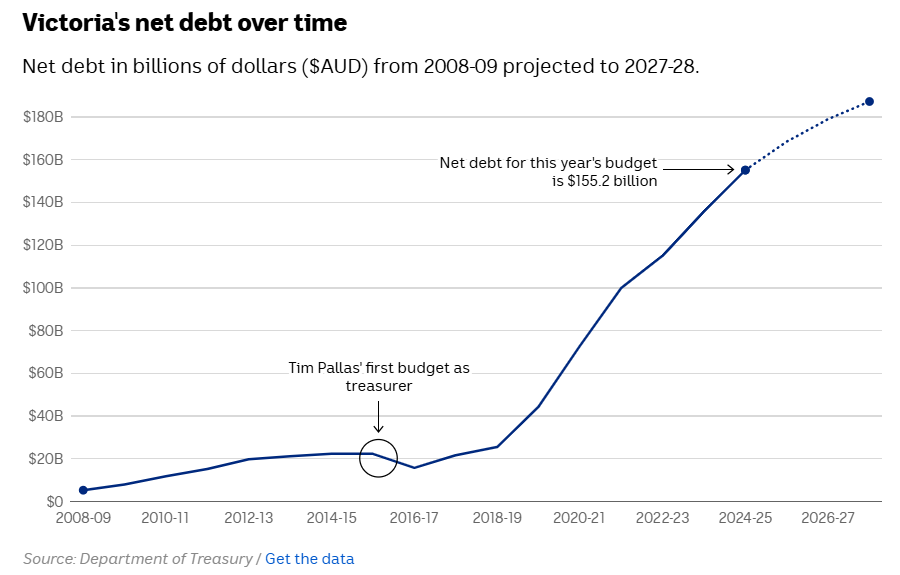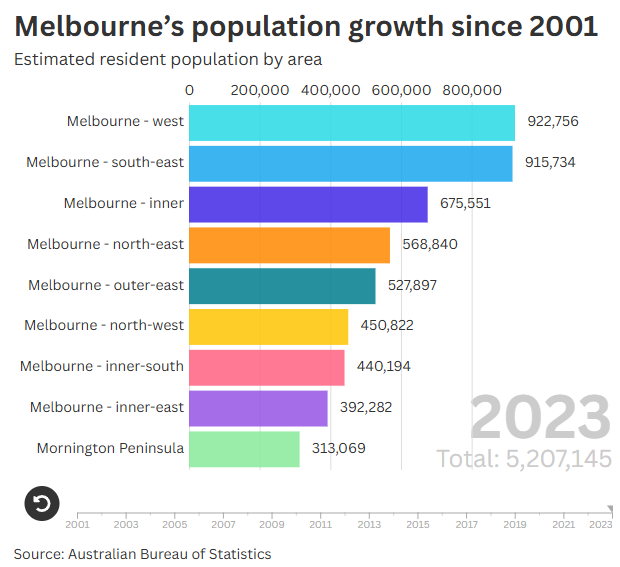Against expert advice, Victorian Premier Jacinta Allan chose to sign the contracts to build the first leg of the $200-plus billion Suburban Rail Loop (SRL) project.
These experts warned that the SRL would be a $200-plus billion waste of money and wanted it axed.
The enormous cost of the SRL will plunge Victoria deeper into debt, resulting in further credit rating downgrades and soaring interest costs.

The project will also consume most of the state’s infrastructure budget, starving existing transport corridors and growth areas of funding for decades.
Dr Bob Birrell from the Australian Population Research Institute told 9News in August that the state government was deliberately starving Melbourne’s fringe of infrastructure and diverting funding to big build projects like the SRL:
“The government for decades has been trying to rest the spread of suburbia and has diverted funds from infrastructure like transport services in the fringe and instead diverting those funds to (big) projects like the Suburban Raik Loop, which is starving the fringe of funds”.
“Their priority is actually to slow development – and one way to do that is to starve those fringe areas of funds”.
The Age reported that Melbourne’s west has absorbed far more population growth than any other area of the city, surging at twice the rate of the east since 2001.

“I don’t think people yet grasp just how big this region is and how rapidly it’s growing”, says Peter Dawkins, who was vice chancellor of Victoria University, the west’s only university, between 2011 and 2020.
Melbourne’s west is projected to expand at a rapid pace, with the Labor government heaping some of the state’s highest housing targets on western municipalities over the coming decade.
The number of homes in Melton is projected to grow by 190%, Maribyrnong by 114% and Wyndham by 110%.
Yet, these areas are already starved of infrastructure, which will only worsen as their populations explode.
Melton and Wyndham are still served by diesel trains. The City of Melton has one library for every 28,000 young people, compared to one for every 3000 in inner Melbourne.
In the City of Wyndham, there is one aquatic centre for every 48,000 young people, compared to 5000 in inner Melbourne.
“It’s crazy. You should have seen kids walking for kilometres to catch a bus”, western suburbs bus campaigner Senthill Sundaram says. “They’re paying $1 million for a house, paying all their taxes and then living like [in] a Third World country”.
“We’re in a very desperate situation where we need to see more investment as we continue to grow”, Melton Mayor Steve Abboushi said.
Meanwhile, leaked modelling of future demand on the SRL revealed a woeful underutilisation of the line.
The leaked analysis shows that by mid-century—when Melbourne houses eight million people—there would be only 24,000 trips a day between the first two SRL stations, Cheltenham and Clayton, in Melbourne’s southeast.
It shows that by the same year, trains running between Sunshine and Footscray in Melbourne’s booming west, would be crammed with a whopping 270,000 passengers…
Labor ministers say the data was not shared with Cabinet, which was kept in the dark during key decision-making processes for the SRL…
One Labor minister said the data was not shared with other MPs at the time and that there was little information provided about modelling during decision-making.
“This is exactly why they didn’t bring the SRL to the general Cabinet … at the decision-making point,” they said.
By ignoring expert advice and signing contracts to build the SRL, the State Labor government has condemned Victorian taxpayers to decades of crippling debt and lower living standards for a ghost train to nowhere.
Infrastructure-starved residents in Melbourne’s rapidly growing west will be the biggest casualties of Labor’s folly.

